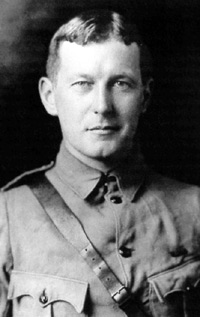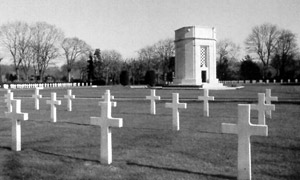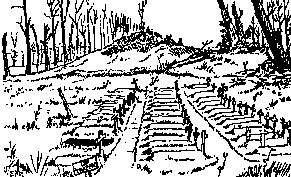The making of 'In Flanders Fields'
By Rob Ruggenberg 
 The poem "In Flanders Fields" by the Canadian army physician John McCrae (picture left) remains to this day one of the most memorable war poems ever written. It is a lasting legacy of the terrible battle in the Ypres salient in the spring of 1915.
The poem "In Flanders Fields" by the Canadian army physician John McCrae (picture left) remains to this day one of the most memorable war poems ever written. It is a lasting legacy of the terrible battle in the Ypres salient in the spring of 1915.
The most asked question is: why poppies?
Wild poppies flower when other plants in their direct neighbourhood are dead. Their seeds can lie on the ground for years and years, but only when there are no more competing flowers or shrubs in the vicinity (for instance when someone firmly roots up the ground), these seeds will sprout.
There was enough rooted up soil on the battlefield of the Western Front; in fact the whole front consisted of churned up soil. So in May 1915, when McCrae wrote his poem, around him bloodred poppies blossomed like no one had ever seen before.
But in this poem the poppy plays one more role. The poppy is known as a symbol of sleep. The last line We shall not sleep, though poppies grow / In Flanders fields might point to this fact. Some kinds of poppies are used to derive opium from, from which morphine is made. Morphine is one of the strongest painkillers and was often used to put a wounded soldier to sleep. Sometimes medical doctors used it in a higher dose to put the incurable wounded out of their misery.
Flanders, in Belgium
Flanders is the name of the whole western part of Belgium. It is flat, soggy country where people speak Flemish, a kind of Dutch. Flanders (Vlaanderen in Flemish) holds old and famous cities like Antwerp, Bruges and Ypres. It is ancient battleground. For centuries the fields of Flanders have been soaked with blood.
 'In Flanders Fields' is also the name of an American War Cemetery in Belgium (picture right), where 368 Americans are buried. This cemetery is situated near the village of Waregem, quite a distance from the place where McCrae actually wrote his poem. The cemetery got its name from the poem though. The bronze foot of the flag-staff is decorated with daisies and poppies.
'In Flanders Fields' is also the name of an American War Cemetery in Belgium (picture right), where 368 Americans are buried. This cemetery is situated near the village of Waregem, quite a distance from the place where McCrae actually wrote his poem. The cemetery got its name from the poem though. The bronze foot of the flag-staff is decorated with daisies and poppies.
Another reference to the poem can be found on the Canadian War Memorial at Vimy, in Northern France. Between the pylons stands ‘The Spirit of Sacrifice�? a figure holding high a burning torch, obviously referring to the last verse of McCrae's poem.
'In Flanders Fields' may be the most famous poem of the Great War �?sometimes only the first two verses are cited or printed. This is not just because of the lack of quality in the third verse, but also because this last verse speaks of an unending quarrel with the foe. And if one thing became clear during the Great War it was this: there was no quarrel between the soldiers (except maybe in the heat of a fight). The quarrel existed mainly in the minds of stupid politicians and generals who mostly never experienced the horror of the battlefield.
But McCrae was not opposed to war and this was not the first time he spoke of a continuing fight. Wars should go on, he thought, until all the wrongs of the earth are righted. In some countries authorities were so pleased with the pugnacious sentiments in the third verse of 'In Flanders Fields' that they exploited these lines in their propaganda. Since then the now widespread custom to honour with poppies those who died so that we could be free, has been, and still is, used and misused to justify wars.
Nevertheless I will give you the full and exact version of McCrae's great poem, taken from his own, handwritten copy. But first, here is the story of how he wrote it �?and how the recent death of a dear friend moved him.
Sixteen Days of Hell
Although he had been a doctor for years and had served in the bloody Boer War in South Africa, it was impossible to get used to the suffering, the screams, and the blood here in Flanders, and Major John McCrae had seen and heard enough in his dressing station to last him a lifetime.
As a surgeon attached to the Canadian 1st Field Artillery Brigade, Major McCrae had spent sixteen days treating injured men �?Canadians, British, Indians, French and Germans �?in the Ypres salient.
It had been an ordeal that he had hardly thought possible. McCrae later wrote to his mother:
"Seventeen days of Hades! At the end of the first day if anyone had told us we had to spend seventeen days there, we would have folded our hands and said it could not have been done."
(Click
here if you want to read the complete letter �?and other letters that McCrae wrote from the front)
One death particularly affected McCrae. A young friend and former student, Lieut. Alexis Helmer of Ottawa, had been killed by a shell burst on 2 May 1915. His remains were scattered all over the place. Soldiers gathered them and put them in sandbags. These were laid on a army blanket that was closed with safety pins.
The burial, in the rapidly growing cemetery (called Essex Farm), just outside McCrae's dressing station, was postponed until late that evening. McCrae performed the funeral ceremony in the absence of the chaplain, reciting from memory some passages from the Church of England's Order of Burial of the Dead. This happened in complete darkness, as for security reasons it was forbidden to make light.
The Poem
 The next evening, sitting on the rearstep of an ambulance parked near the dressing station beside the Yser Canal, just a few hundred yards north of Ypres, McCrae vented his anguish by composing a poem. The major was no stranger to writing, having authored several medical texts besides dabbling in poetry.
The next evening, sitting on the rearstep of an ambulance parked near the dressing station beside the Yser Canal, just a few hundred yards north of Ypres, McCrae vented his anguish by composing a poem. The major was no stranger to writing, having authored several medical texts besides dabbling in poetry.
As McCrae sat there he heard larks singing and he could see the wild poppies that sprang up from the ditches and the graves in front of him (see the drawing right by Edward Morrison, or this picture of the cemetery, made shortly after the war).
He spent twenty minutes of precious rest time scribbling fifteen lines of verse in a notebook.
A young soldier watched him write it. Cyril Allinson, a twenty-two year old sergeant-major, was delivering mail that day when he spotted McCrae. The major looked up as Allinson approached, then went on writing while the sergeant-major stood there quietly.
"His face was very tired but calm as he wrote", Allinson recalled. "He looked around from time to time, his eyes straying to Helmer's grave."
When McCrae finished five minutes later, he took his mail from Allinson and, without saying a word, handed his pad to the young NCO. Allinson was moved by what he read:
"The poem was an exact description of the scene in front of us both. He used the word blow in that line because the poppies actually were being blown that morning by a gentle east wind. It never occurred to me at that time that it would ever be published. It seemed to me just an exact description of the scene."
Experimenting With The Metre
Allinson's account corresponds with the words of the commanding officer at the spot, Lieutenant Colonel Edward Morrison. This is how Morrison (a former Ottawa newspaper editor) described the scene:
"This poem was literally born of fire and blood during the hottest phase of the second battle of Ypres. My headquarters were in a trench on the top of the bank of the Ypres Canal, and John had his dressing station in a hole dug in the foot of the bank. During periods in the battle men who were shot actually rolled down the bank into his dressing station.
Along from us a few hundred yards was the headquarters of a regiment, and many times during the sixteen days of battle, he and I watched them burying their dead whenever there was a lull. Thus the crosses, row on row, grew into a good-sized cemetery.
Just as he describes, we often heard in the mornings the larks singing high in the air, between the crash of the shell and the reports of the guns in the battery just beside us.
I have a letter from him in which he mentions having written the poem to pass away the time between the arrival of batches of wounded, and partly as an experiment with several varieties of poetic metre."
The poem (initially called We shall not sleep) was very nearly not published. Dissatisfied with it, McCrae tossed the poem away, but Morrison retrieved it and sent it to newspapers in England.
The Spectator, in London, rejected it and send the poem back, but Punch published it on 8 December 1915 (although the magazine misspelled his name as McCree and promoted him to Lt. Colonel):
 Free Forum Hosting
Free Forum Hosting